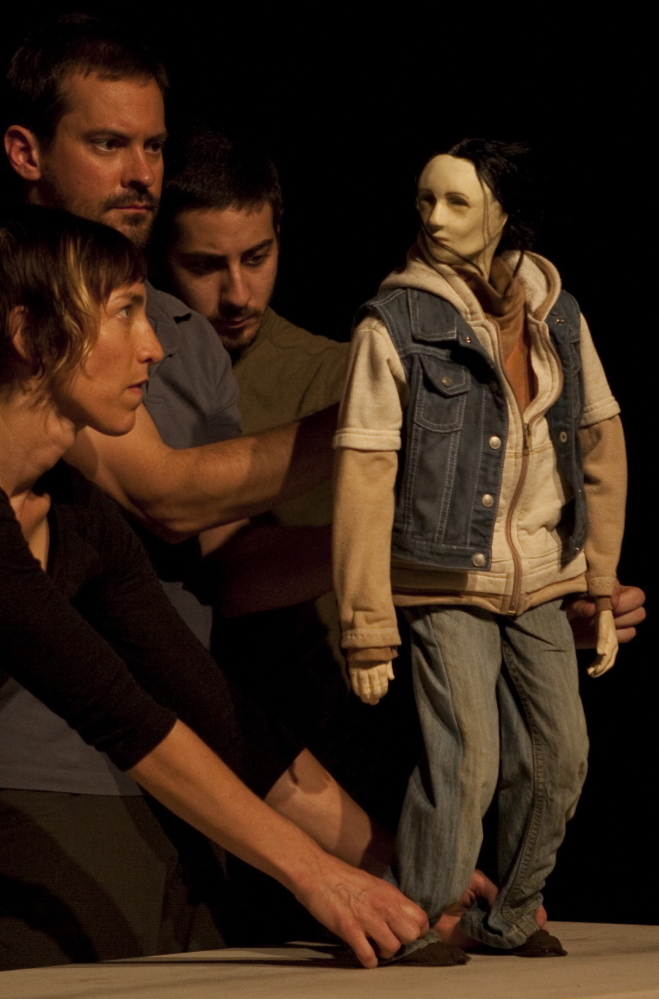Typically, a touring performance troupe comes to town, does a show and leaves for the next city. But the puppeteers and dancers who will bring “Who’s Hungry” to Space Gallery beginning Thursday hope their show will have a longer-term effect on the people of Portland.
Their performance will explore hunger in Maine and offer audiences a chance to think about solutions. The production tells the stories of five homeless or hungry people, using dance, puppetry, music and dialogue, said co-creator Dan Froot, who lives in California. Froot came to Portland in December to research the show and has spoken by phone and via video with homeless advocates here several times since.
“Who’s Hungry” plays out on a 24-foot dinner table. The audience is seated as if they are at a banquet. Instead of food, the four performers serve stories. They are visible to the audience and operate the puppet from behind.
“We generally say that this show is puppetry, but there’s a large container for what we think of as puppetry,” Froot said. “All the performers are first and foremost dancers. There’s a lot of movement in the piece.”
While this week’s performances tell the stories of homeless and hungry people from around the country, the intent is to find local solutions.
“Not only is food insecurity prevalent in Portland and in Maine, but it’s also solvable,” Froot said. “We saw this as an opportunity to bring people together who are working on this issue.”
About 15 percent of people in Maine experienced food insecurity over three years ending in 2012, according to a U.S. Department of Agriculture survey that asks whether people have had to go without meals or been unable to afford a full, balanced diet. Seven percent are considered to have very low food security.
People who are food-insecure lack the money to buy healthy, nutritious food, said Amy Regan Gallant, advocacy coordinator for Preble Street Resource Center and director of the Maine Hunger Initiative. Preble Street is among the partners that Portland Ovations tapped when it put this program together. Others are the United Way, Portland Public Schools and corporate sponsor Pierce Atwood, a Portland law firm.
The firm has long championed hunger relief as part of its charitable work, said partner Louise K. Thomas, who also is on the board of Portland Ovations. This project allowed Pierce Atwood to merge its artistic and social interests, she said.
“Portland Ovations didn’t just ask us for a check and put our names on the program and then kiss us goodbye, which is what all too often happens with corporate sponsorships,” she said.
Instead, lawyers at the firm helped plan the program, met with Preble Street administrators and talked with Froot and his creative team. In addition, the firm created a two-page list of actions employees could take to help alleviate hunger in Maine, including making donations to the local food bank, raising money through hunger walks and getting involved at the Legislature.
Those same ideas will be shared with audiences at the performances.
“It seems to me that this is a much better way to have corporate participation,” Thomas said. “The purpose of the performance is to raise the awareness of the class of people who pay for theater tickets and go to restaurants, so they understand what is going on in the rest of Portland.”
Aimee Petrin, executive director of Portland Ovations, said she was bringing the troupe to town based on its artistic merit. She has worked before with Froot and his collaborator, Dan Hurlin, and she appreciates their art. If, at the same time, Portland Ovations can foster a community discussion about an important issue, all the better.
It’s an opportunity to use art as a springboard for community action, she said. “Just walking down the street and seeing what is happening here in terms of what people need to survive, it was so clear to us that this was a way we could have even just a small impact on the issue,” she said.
Froot was inspired to make art with a social component when he lived in the East Village of New York in the 1980s and 1990s. He was surrounded by artists who responded to the AIDS crisis, homophobia, racism and other issues through art. He cited John Bernd, Tim Miller, Ishmael Houston-Jones, Carmelita Tropicana, Holly Hughes, Karen Finley and others whose art is a form of activism.
He decided to focus on hunger after the birth of his twins in 2000.
“I came to feel incredibly privileged by the fact that my partner and I were able to provide them with everything they needed: you feed them, they grow,” Froot said.
“I decided to treat privilege as a platform for doing good in the world. All I know how to do is to tell stories, so I decided that I could help other people tell their own stories that might otherwise go untold.”
Bob Keyes can be contacted at 791-6457 or at:
bkeyes@pressherald.com
Twitter: pphbkeyes
Send questions/comments to the editors.




Success. Please wait for the page to reload. If the page does not reload within 5 seconds, please refresh the page.
Enter your email and password to access comments.
Hi, to comment on stories you must . This profile is in addition to your subscription and website login.
Already have a commenting profile? .
Invalid username/password.
Please check your email to confirm and complete your registration.
Only subscribers are eligible to post comments. Please subscribe or login first for digital access. Here’s why.
Use the form below to reset your password. When you've submitted your account email, we will send an email with a reset code.